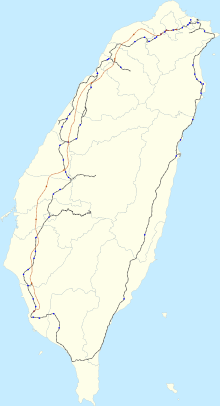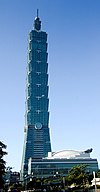|
Transportation in Taiwan
 The Ministry of Transportation and Communications governs transportation in Taiwan. Land transport Roads
Rail Total: 1,580 km (2009) (all on the island of Taiwan)
  High-speed railThe Taiwan High Speed Rail (THSR) commenced operations on 5 January 2007, after some delays in 2006. The THSR connects Taipei City in the northeast of the island of Taiwan to Kaohsiung City in the southwest. The journey time is about 90 minutes compared to ~3 hours by conventional rail. 30 Shinkansen Class 700T sets are running on the 345 km high-speed line, with station stops at Taipei Main Station, Banqiao, Taoyuan, Hsinchu, Taichung, Chiayi, Tainan and Zuoying District In Kaohsiung. Four additional stations have been opened: Nangang in eastern Taipei, Miaoli, Changhua and Yunlin. In 2008 THSR increased the number of trains to 88 per day, each way. The Shinkansen 700T is similar to the Japanese 700 Nozomi. It operates in 12 car sets (9 powered, 3 trailers) at a speed limit of 300 km/h over standard gauge 1,435 mm (4 ft 8+1⁄2 in) track. OCS power is 25 kV AC 60 Hz. Conventional railThe Taiwan Railways Administration (TRA) is the national conventional passenger railway operator in Taiwan, established on 5 March 1948. Railway services began in 1891 between Keelung and Hsinchu under mainland China's Qing Dynasty, with a complete reform intended under the Japanese Colonial Government. This Japanese influence remains in TRA's various operations today, where JR (Japan Railways) tack layout, fare gates, and signage can still be observed.[1] With increased competition from the Taiwan High Speed Rail for long-distance services on the west coast, TRA has begun placing emphases on commuter and tourist services.[2] Urban transitThere are five urban transit systems in Taiwan: Taipei Metro, New Taipei Metro, Taichung Metro, Taoyuan Metro, and Kaohsiung Metro. Taipei Metro opened in 1996 and runs on an extensive network of both Multiple Unit for the high-capacity system as well as VAL for the medium-capacity system throughout the metropolitan area of Taipei. The metro system operates 6 lines consisting of 131 stations.[3] Kaohsiung Metro is a metro system that currently has two lines, the Red line, and the Orange line consisting of 37 Stations.[4][5] Both of these lines opened In 2008.[6] Along with these lines, the Yellow line is under construction, and will cover nearly 42% of the city's population, having an expected daily ridership of 180,000 and is to be completed by 2028.[7][8][9] The metro currently runs in 3 car sets manufactured by Siemens. The Taoyuan Metro is a metro system with one operational line, one in construction, and one in planning. (Airport MRT, green, brown).[10] The Airport MRT serves Taoyuan, Taipei and New Taipei after it opened in March 2017. Taichung Metro officially began operation on April 25, 2021, with its Green Line opening. In addition to Taichung, the network will also serve the Changhua and Nantou counties. The metro will start off with 3 main lines (green, blue, and orange), with four other lines planned.[11] BusesVarious conventional urban and intercity bus operators conduct services in Taipei and other major cities. Some of the most notable players include Taipei Bus (台北客運) and Capitol Bus (首都客運).[12] Taichung and Chiayi BRTTaichung's BRT (Bus Rapid Transit) was the first BRT system in Taiwan, spanning 17.1 kilometres (10.6 mi) from Taichung TRA Station to Providence University via the Taiwan Boulevard, containing 21 dedicated right-of-way stations. This line was shut down and converted to a dedicated bus lane on July 8, 2015.[13] Chiayi's Bus Rapid Transit system remains in service,[14] connecting Chiayi High Speed Rail station to downtown Chiayi City via Chiayi County. It uses dedicated bus lanes and GPS-controlled traffic signals to speed up commutes between terminals. Air transportAirportsDuring the global COVID-19 pandemic traffic at Taiwan’s large international airports fell sharply while traffic to smaller domestic airports increased as a result of a surge in domestic tourism.[15] Total: 40 Length of runways:
AirlinesTotal: 7 HeliportsTotal: 31 (2013)[16] Sea transportPortsPort of Kaohsiung Is the largest port in Taiwan, and the thirteenth largest in the world.[17] It is located near the Western districts In Kaohsiung, including Gushan, Yancheng, Lingya, Cianjhen, Siaogang, and Cijin. The port Is easily accessible by Sizihwan metro station, and by various Light Rail stations.[18][19] Other Major ports: Keelung, Taichung, Hualien General ports: Anping, Su'ao, Taipei Merchant marine:
112 ships (1,000 GT or over) totaling 3,827,173 GT/6,121,877 tonnes deadweight (DWT) (2010)
Pipelines
As of 2013, Taiwan maintains the following pipelines[20]
See alsoReferences
Wikimedia Commons has media related to Transport in Taiwan. |
